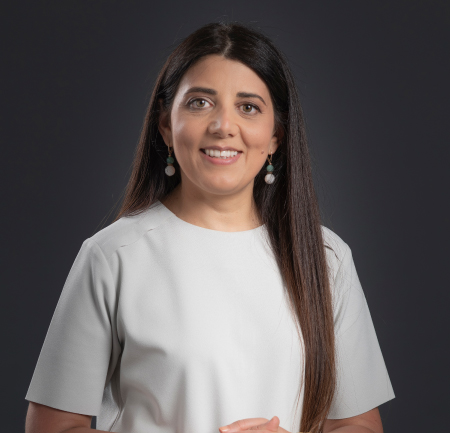
Why women in STEM matters

Ms Natassa Frederickou, President of Frederick University Council, explains why including women and girls in Engineering and Technology will contribute to a fairer world
Did you know that only 30% of all researchers in the world are women? Or that in the 120 years of Nobel Prizes in medicine, physics and chemistry, prizes were awarded 599 times to men and only 23 times to women?
In 2021, Frederick University launched a campaign to encourage more girls and women to study Engineering, Science and Technology. Ms Natassa Frederickou, President of the Council of Frederick University and an avid supporter of women’s rights and gender equality, gives us the facts regarding the under-representation of women in STEM (Science, Technology, Engineering and Mathematics) and explains why the equal representation of boys and girls in these areas can contribute to achieving a fairer and more peaceful world.
“For every 1000 Computer Science graduates, only 24 are women, while in the fields of Engineering and Construction only 8% are female graduates. Such huge disparities, such deep inequality, do not just happen. Too many girls are held back by discrimination, biases, stereotypes, social norms and expectations that influence both the quality of education they receive and the subjects they choose to study”, comments Ms Frederickou.
As the President of the Council explains: “We need to understand and target the particular obstacles that keep female students away from STEM. We need to stimulate interest from the early years. When a girl chooses school subjects she is often influenced by prejudice and stereotypes that consider science lessons and professions to be male in nature. For example, practical thinking is considered a male characteristic. According to some studies, children perceive mathematics as a subject for boys, not for girls, as early as in the second grade (that is around 8 years of age). In these studies, these children applied the stereotype to themselves: boys identified themselves with math, whereas girls did not. All these affect the choices of girls and their studies. Girls are reluctant to choose subjects related to science and technology, even when they excel in these courses.”
So how can we encourage more girls to choose studies in STEM?
“I don’t think we need to try hard” says Ms Frederickou. “Girls are naturally curious, creative, innovative and problem solvers. All these are characteristics of someone who is in STEM. The problem is that we make girls believe that they have limits. That these fields are not for them. So, what we need to do is combat stereotypes in schools and at home. We need to train teachers about unconscious gender bias, how they speak to children, what they should encourage them to do, we need to develop curricula that are gender-sensitive and make women in STEM visible. Girls need to see role models.”
Indeed: can you name a woman in Technology as easily as you would name a man?
“The lack of female role models plays a very important role”, comments Ms Frederickou. “Girls cannot aspire to be someone they cannot see. They cannot imagine themselves being engineers if the only engineers they see are male. At our University, many girls choose to study Architecture and Pharmacy in contrast to more hard-core engineering programs such as Mechanical Engineering, Electrical Engineering, Automotive Engineering or Civil Engineering. I can still remember the example of a female student’s father who wouldn’t speak to her for 6 months because she had decided to study Civil Engineering! He was concerned that his daughter would end up in a working environment that is hostile towards women. It is very important that workplaces create an inclusive corporate culture where female engineers and scientists thrive and progress.”
What would keeping women out of STEM fields mean? As we are going through the 4th Industrial Revolution, the occupations in the fields of technology, science and engineering present excellent employment prospects with attractive salary packages. By 2050, half of the jobs in the world today will disappear, affecting women to a greater extent. If women cannot make the transition to technology and science, they will lose access to the job market and will be disproportionately affected by unemployment.
Moreover, many occupations that have traditionally been performed by women tend to be less well paid, so women around the world are disadvantaged compared to men. It is estimated that by 2030, some 40-160 million women will need to change careers and move to more specialized roles that require more sophisticated digital skills.
In addition to this, there is also the phenomenon of the “leaky pipeline” of lost talent. We see that even girls who choose to study science at a Bachelor’s level and some at a Master’s level, do not continue their studies at a PhD level. There is a dramatic drop in numbers at PhD level.
Why is this happening? According to Ms Frederickou, “The main reason is that there is no support for women. Women are expected to take care of the family, the kids, the house. Many times, as a result, some women do not want to advance their careers. In other cases, even if they want to progress, it is impossible for them to do so. And, in some cases, the decision-makers do not promote women because they falsely believe they will not be able to live up to the expectations of the position because of all the other things that they are expected to do”.
Universities can contribute to a fairer world. This is what Frederick University’s “Join the Journey in Engineering and Technology” campaign is trying to achieve. “As a University, we are committed to promoting gender equality. That is why we launched this long-term awareness campaign, targeting girls from a young age. Through the campaign, which is under the auspices of the Commissioner for Gender Equality, we inform girls and women about the prospects of the STEM sectors in order to reduce the gender gap that exists at the moment in education as well as the industry.”
In the campaign’s framework, Frederick University is offering a 50% Scholarship to all girls and women who choose to study an undergraduate program at the School of Engineering. The University also joins forces with successful women in these fields, who can be a source of inspiration for girls of all ages. Furthermore, it organizes experiential workshops and interactive events for girls in order to get them in touch with the STEM areas.
Last, but not least, here is Ms Natassa Frederickou’s message to the girls: “Don’t let anyone tell you what you can and cannot do. You have every right to dream and believe that you can achieve your dreams!” What is equally important, “we need to encourage girls to believe that anything is possible but also provide the means so that they are able to do so!”

